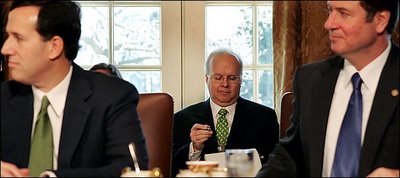 So, let me get this straight:
So, let me get this straight:Bush makes a contrived case for war built around politicized intelligence, launches a premature invasion, completely botches the occupation and reconstruction, declares mission accomplished long before any mission has been accomplished, keeps changing the rationale for going to war as each rationale crumbles under the weight of evidence, stands hapless and helpless while the country he invaded descends into sectarian violence and civil war and while pressing problems throughout the rest of the world worsen, barely even acknowledges that any mistakes were ever made, shifts responsibility onto future presidents, spins fantasy upon fantasy as truth, loses the confidence of the American people, and now...
Now he tells the Iraqis to "get governing" themselves? Excuse me while I bang my head against the wall, over and over and over again.
Nothing against the Iraqis, and I know that at some point they'll have to assume the ultimate responsibility of self-governance all by themselves, but isn't it all rather rich of Bush to foist that responsibility on them now, given all that he's done to ruin any hope Iraq may have had of transitioning peacefully to democracy?
This is his war. The civil war now raging in Iraq and threatening the long-term prospects of Iraqi democracy, is a result of that war. It seems to me that the chain of responsibility is clear.







